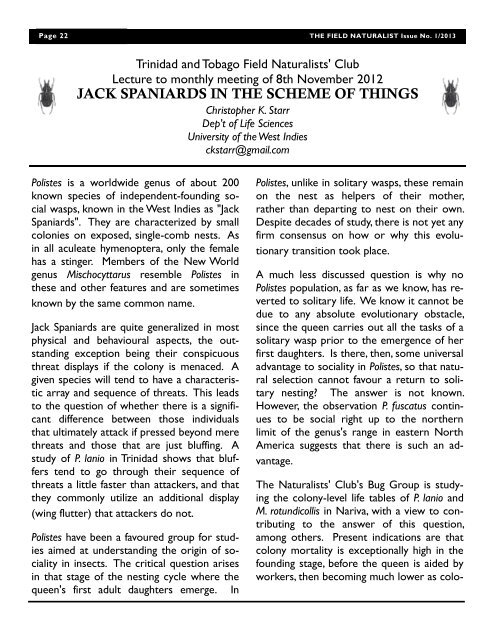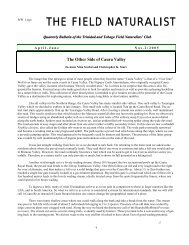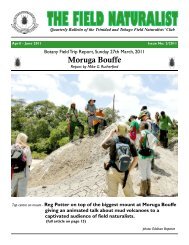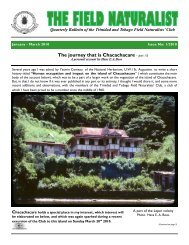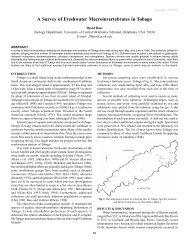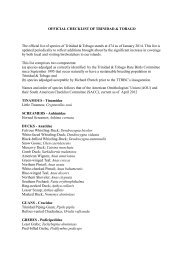Vol 1 - The Trinidad and Tobago Field Naturalists' Club
Vol 1 - The Trinidad and Tobago Field Naturalists' Club
Vol 1 - The Trinidad and Tobago Field Naturalists' Club
You also want an ePaper? Increase the reach of your titles
YUMPU automatically turns print PDFs into web optimized ePapers that Google loves.
Page 22 THE FIELD NATURALIST Issue No. 1/2013<strong>Trinidad</strong> <strong>and</strong> <strong>Tobago</strong> <strong>Field</strong> <strong>Naturalists'</strong> <strong>Club</strong>Lecture to monthly meeting of 8th November 2012JACK SPANIARDS IN THE SCHEME OF THINGSChristopher K. StarrDep't of Life SciencesUniversity of the West Indiesckstarr@gmail.comPolistes is a worldwide genus of about 200known species of independent-founding socialwasps, known in the West Indies as "JackSpaniards". <strong>The</strong>y are characterized by smallcolonies on exposed, single-comb nests. Asin all aculeate hymenoptera, only the femalehas a stinger. Members of the New Worldgenus Mischocyttarus resemble Polistes inthese <strong>and</strong> other features <strong>and</strong> are sometimesknown by the same common name.Jack Spaniards are quite generalized in mostphysical <strong>and</strong> behavioural aspects, the outst<strong>and</strong>ingexception being their conspicuousthreat displays if the colony is menaced. Agiven species will tend to have a characteristicarray <strong>and</strong> sequence of threats. This leadsto the question of whether there is a significantdifference between those individualsthat ultimately attack if pressed beyond merethreats <strong>and</strong> those that are just bluffing. Astudy of P. lanio in <strong>Trinidad</strong> shows that blufferstend to go through their sequence ofthreats a little faster than attackers, <strong>and</strong> thatthey commonly utilize an additional display(wing flutter) that attackers do not.Polistes have been a favoured group for studiesaimed at underst<strong>and</strong>ing the origin of socialityin insects. <strong>The</strong> critical question arisesin that stage of the nesting cycle where thequeen's first adult daughters emerge. InPolistes, unlike in solitary wasps, these remainon the nest as helpers of their mother,rather than departing to nest on their own.Despite decades of study, there is not yet anyfirm consensus on how or why this evolutionarytransition took place.A much less discussed question is why noPolistes population, as far as we know, has revertedto solitary life. We know it cannot bedue to any absolute evolutionary obstacle,since the queen carries out all the tasks of asolitary wasp prior to the emergence of herfirst daughters. Is there, then, some universaladvantage to sociality in Polistes, so that naturalselection cannot favour a return to solitarynesting? <strong>The</strong> answer is not known.However, the observation P. fuscatus continuesto be social right up to the northernlimit of the genus's range in eastern NorthAmerica suggests that there is such an advantage.<strong>The</strong> <strong>Naturalists'</strong> <strong>Club</strong>'s Bug Group is studyingthe colony-level life tables of P. lanio <strong>and</strong>M. rotundicollis in Nariva, with a view to contributingto the answer of this question,among others. Present indications are thatcolony mortality is exceptionally high in thefounding stage, before the queen is aided byworkers, then becoming much lower as colo-


